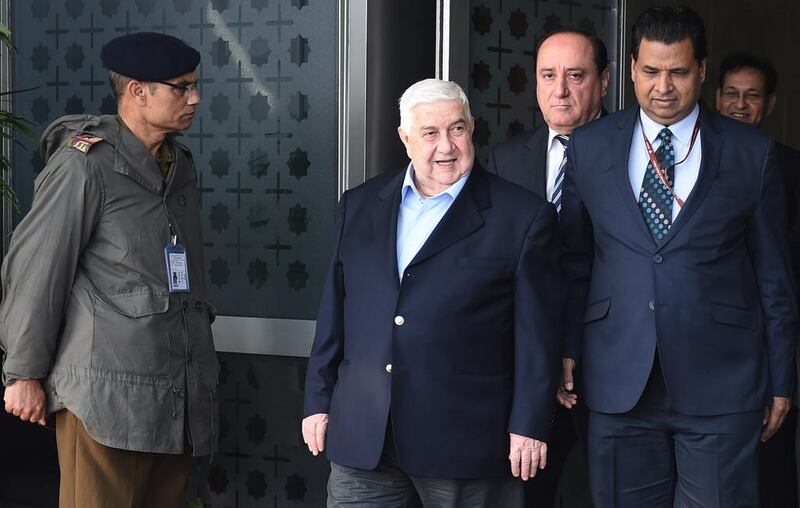NEW DELHI // Syria’s deputy prime minister and foreign minister began a four-day visit to New Delhi on Monday, becoming the highest-ranking Syrian official to travel to India since the civil war began in 2011.
Walid Al Moualem’s visit comes just before India’s foreign minister, Sushma Swaraj, travels to Israel and Palestine later this week, furthering her country’s cautiously balanced relationship with the Middle East.
In Delhi, Mr Moualem will meet prime minister Narendra Modi, as well as Ms Swaraj and Ajit Doval, India’s national security adviser. The two countries will discuss trade and energy ties, but the agenda will be dominated by Middle East security, the Syrian war and ISIL.
India has opposed regime-change efforts in Syria by western powers, but in a muted manner, called only for the violence to cease.
“In general, India does not support externally sponsored regime change, which works in the favour of the Bashar Al Assad government,” said Kanchi Gupta, an associate fellow at the Observer Research Foundation, a think tank in New Delhi.
India’s position against externally sponsored regime change dates back to the Cold War, when it was part of a non-aligned group of countries, allied with neither the United States nor the Soviet Union, and urging these powers to refrain from interfering in the governance of other smaller countries.
The post-revolution relationship between India and Syria has remained cordial. Perhaps for this reason, the Syrian regime has in the past called upon India to adopt the role of a conciliator in the war.
Last May, the Syrian ambassador in India Riad Kamel Abbas said: “India is in a rare position where it has good relations with both Syria and the big world powers, and so it can really help.”
But India has steadfastly refused to step into such a role. Responding to reports that India was considering playing mediator, Vikas Swarup, the spokesperson for the ministry of external affairs, categorically denied last May that India offered its services in this regard.
India’s careful position on Syria is born in part out of pragmatism, said Gauri Khandekar, the director of the Global Relations Forum, a Brussels-based think tank.
"If Assad goes, the Middle East largely collapses, and given the region's significance to India's core interests, India certainly does not want the same fate for Syria as of Iraq or Libya," Ms Khandekar told The National.
These interests include oil imports from the Middle East and the threat of terror groups reaching South Asia. While Syria is not a major source of oil for India, the country has two significant investments in Syria’s petroleum sector - one is a state-owned firm to explore an oil block in nothern Syria, the other a stake in the Al Furat Petroleum Company.
As the Syrian war turned slowly into a battle between Mr Assad’s government and ISIL-backed rebels, Ms Khandekar said, India has found even more reason to oppose regime change.
“The main worry ... is that the continuing war is becoming a war cry for others to join, just as it did in Chechnya or Afghanistan,” she said. “ISIL has large footholds in Syria. Clearing Syria of ISIL could help stem the infection.”
At the same time, India has refused to send troops to the coalition that is fighting ISIL, despite a request from the United States to do so.
“The government knows that ISIL is, in a sense, on its doorstep, but it has preferred to focus on intelligence and counter-terrorism, rather than on the option of sending its troops to fight,” Ms Gupta said.
Part of this is in line with India’s long-held policy of sending its soldiers overseas only with United Nations peacekeeping missions.
“But also, right now, there are so many anti-ISIL coalitions, India wouldn’t know which one to join,” Ms Gupta said. “There’s a US-led coalition, a Saudi Arabia-led coalition, a Russia-led coalition.”
“Joining any of these coalitions could be interpreted as India being anti-Sunni,” she pointed out. “There’s no benefit to that at all. If there’s a UN-mandated ceasefire at some point, maybe then we’ll see Indian troops participating.”
Mr Moualem’s visit is well-timed, Ms Gupta said. Peace negotiations between the Syrian government and opposition groups begin in Geneva on January 25.
“Russian air strikes are slowly debilitating ISIL. There’s a spat between Saudi Arabia and Iran. There’s even talk that ISIL might shift from Syria to Libya,” she said.
“So Assad sees this as time [for] an opportunity to lobby all the countries he can, and he would want to lobby India to play a larger role in the peace process precisely because India is favourable to his government.”
ssubramanian@thenational.ae





